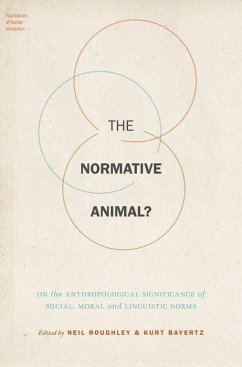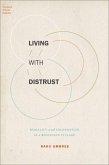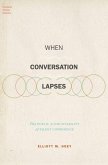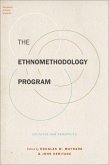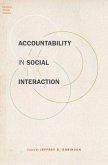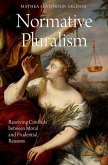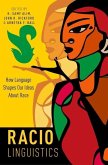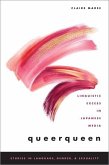Bayertz Roughley
Normative Animal? Fhi C
Bayertz Roughley
Normative Animal? Fhi C
- Gebundenes Buch
- Merkliste
- Auf die Merkliste
- Bewerten Bewerten
- Teilen
- Produkt teilen
- Produkterinnerung
- Produkterinnerung
An interdisciplinary group of scholars investigates the claim that humans are essentially normative animals. They do so by looking at the nature and relations of three types of norms, or putative norms-social, moral, and linguistic-and asking whether they might be different expressions of one basic structure unique to humankind.
Andere Kunden interessierten sich auch für
![Living with Distrust Living with Distrust]() Radu Umbres (Lecturer in Anthropology, Lecturer in Anthropology, NaLiving with Distrust142,99 €
Radu Umbres (Lecturer in Anthropology, Lecturer in Anthropology, NaLiving with Distrust142,99 €![When Conversation Lapses When Conversation Lapses]() Elliott M. Hoey (Post-doctoral researcher Post-doctoral researcherWhen Conversation Lapses148,99 €
Elliott M. Hoey (Post-doctoral researcher Post-doctoral researcherWhen Conversation Lapses148,99 €![The Ethnomethodology Program The Ethnomethodology Program]() The Ethnomethodology Program60,99 €
The Ethnomethodology Program60,99 €![Accountability in Social Interaction Accountability in Social Interaction]() Jeffrey D RobinsonAccountability in Social Interaction214,99 €
Jeffrey D RobinsonAccountability in Social Interaction214,99 €![Normative Pluralism Normative Pluralism]() Mathea Slattholm Sagdahl (Associ Associate Professor in PhilosophyNormative Pluralism114,99 €
Mathea Slattholm Sagdahl (Associ Associate Professor in PhilosophyNormative Pluralism114,99 €![Raciolinguistics Raciolinguistics]() Raciolinguistics83,99 €
Raciolinguistics83,99 €![Queerqueen Queerqueen]() Claire Maree (Associate Professor & Assoc Reader at Asia InstituteQueerqueen53,99 €
Claire Maree (Associate Professor & Assoc Reader at Asia InstituteQueerqueen53,99 €-
-
-
An interdisciplinary group of scholars investigates the claim that humans are essentially normative animals. They do so by looking at the nature and relations of three types of norms, or putative norms-social, moral, and linguistic-and asking whether they might be different expressions of one basic structure unique to humankind.
Hinweis: Dieser Artikel kann nur an eine deutsche Lieferadresse ausgeliefert werden.
Hinweis: Dieser Artikel kann nur an eine deutsche Lieferadresse ausgeliefert werden.
Produktdetails
- Produktdetails
- Foundations of Human Interaction
- Verlag: Oxford University Press Inc
- Seitenzahl: 392
- Erscheinungstermin: 10. Juli 2019
- Englisch
- Abmessung: 241mm x 156mm x 39mm
- Gewicht: 678g
- ISBN-13: 9780190846466
- ISBN-10: 0190846461
- Artikelnr.: 56145858
- Herstellerkennzeichnung
- Libri GmbH
- Europaallee 1
- 36244 Bad Hersfeld
- gpsr@libri.de
- Foundations of Human Interaction
- Verlag: Oxford University Press Inc
- Seitenzahl: 392
- Erscheinungstermin: 10. Juli 2019
- Englisch
- Abmessung: 241mm x 156mm x 39mm
- Gewicht: 678g
- ISBN-13: 9780190846466
- ISBN-10: 0190846461
- Artikelnr.: 56145858
- Herstellerkennzeichnung
- Libri GmbH
- Europaallee 1
- 36244 Bad Hersfeld
- gpsr@libri.de
Neil Roughley is Chair for Philosophical Anthropology and Ethics at the University of Duisburg-Essen. He specializes in metaethics, action theory, philosophical psychology, and the theory of human nature. His historical interests include the classical figures of ethical sentimentalism, particularly Adam Smith and David Hume, as well as the history of action theory. He is author of Wanting and Intending: Elements of a Philosophy of Practical Mind (Springer Macmillan, 2015), has edited several volumes, including Forms of Fellow Feeling: Empathy, Sympathy, Concern and Moral Agency (Cambridge University Press, 2018), and was recently guest editor of a special issue of Philosophical Psychology, vol. 31/5 (2018), on Tomasello's A Natural History of Human Morality. Kurt Bayertz is Senior-Professor of Practical Philosophy at the University of Munster. His research focuses on ethics, anthropology, and selected topics in the history of philosophy. He is author of Technological Intervention in Human Reproduction as a Philosophical Problem (Cambridge: Cambridge UP 1994), among other books. His book Der aufrechte Gang ("The Upright Posture") received the Tractatus Prize for philosophy.
* Foreword
* Part I: Introductory
* 1. Might We Be Essentially Normative Animals?
* Neil Roughley
* 2. On Social, Moral and Linguistic Norms. The Contributions to This
Volume
* Neil Roughley and Kurt Bayertz
* Part II: Social Norms
* 3. There Ought to be Roots. Evolutionary Precursors of Social Norms
and Conventions in Non-Human Primates
* Peter Kappeler, Claudia Fichtel and Carel van Schaik
* 4. On the Human Addiction to Norms. Social Norms and Cultural
Universals of Normativity
* Christoph Antweiler
* 5. On the Identification and Analysis of Social Norms and the
Heuristic Relevance of Deviant Behaviour
* Karl Mertens
* 6. On the Uniqueness of Human Normative Attitudes
* Marco F.H. Schmidt and Hannes Rakoczy
* Part III: Moral Norms
* 7. The Evolution of Human Normativity: The Role of Prosociality and
Reputation Management
* Carel van Schaik and Judith Burkart
* 8. The Form of Morality: Its Importance and Emergence
* Kurt Bayertz
* 9. Joint Activities and Moral Obligation
* Holmer Steinfath
* 10. The Development of Moral and Social Norms, Coordination in
Decision-Making, and the Implications of Social Opposition
* Elliot Turiel and Audun Dahl
* 11. Moral Obligation from the Outside In
* Neil Roughley
* Part IV: Linguistic Norms?
* 12. Language Evolution and Linguistic Norms
* Nikola Kompa
* 13. The Normative Nature of Language
* Nick J. Enfield, Jack Sidnell
* 14. Can there be Linguistic Norms?
* Anne Reboul
* 15. The Normativity of Meaning Revisited
* Hanjo Glock
* Part V: Afterword
* 16. Normative Guidance, Deontic Statuses and the Normative Animal
Thesis
* Neil Roughley
* References
* Part I: Introductory
* 1. Might We Be Essentially Normative Animals?
* Neil Roughley
* 2. On Social, Moral and Linguistic Norms. The Contributions to This
Volume
* Neil Roughley and Kurt Bayertz
* Part II: Social Norms
* 3. There Ought to be Roots. Evolutionary Precursors of Social Norms
and Conventions in Non-Human Primates
* Peter Kappeler, Claudia Fichtel and Carel van Schaik
* 4. On the Human Addiction to Norms. Social Norms and Cultural
Universals of Normativity
* Christoph Antweiler
* 5. On the Identification and Analysis of Social Norms and the
Heuristic Relevance of Deviant Behaviour
* Karl Mertens
* 6. On the Uniqueness of Human Normative Attitudes
* Marco F.H. Schmidt and Hannes Rakoczy
* Part III: Moral Norms
* 7. The Evolution of Human Normativity: The Role of Prosociality and
Reputation Management
* Carel van Schaik and Judith Burkart
* 8. The Form of Morality: Its Importance and Emergence
* Kurt Bayertz
* 9. Joint Activities and Moral Obligation
* Holmer Steinfath
* 10. The Development of Moral and Social Norms, Coordination in
Decision-Making, and the Implications of Social Opposition
* Elliot Turiel and Audun Dahl
* 11. Moral Obligation from the Outside In
* Neil Roughley
* Part IV: Linguistic Norms?
* 12. Language Evolution and Linguistic Norms
* Nikola Kompa
* 13. The Normative Nature of Language
* Nick J. Enfield, Jack Sidnell
* 14. Can there be Linguistic Norms?
* Anne Reboul
* 15. The Normativity of Meaning Revisited
* Hanjo Glock
* Part V: Afterword
* 16. Normative Guidance, Deontic Statuses and the Normative Animal
Thesis
* Neil Roughley
* References
* Foreword
* Part I: Introductory
* 1. Might We Be Essentially Normative Animals?
* Neil Roughley
* 2. On Social, Moral and Linguistic Norms. The Contributions to This
Volume
* Neil Roughley and Kurt Bayertz
* Part II: Social Norms
* 3. There Ought to be Roots. Evolutionary Precursors of Social Norms
and Conventions in Non-Human Primates
* Peter Kappeler, Claudia Fichtel and Carel van Schaik
* 4. On the Human Addiction to Norms. Social Norms and Cultural
Universals of Normativity
* Christoph Antweiler
* 5. On the Identification and Analysis of Social Norms and the
Heuristic Relevance of Deviant Behaviour
* Karl Mertens
* 6. On the Uniqueness of Human Normative Attitudes
* Marco F.H. Schmidt and Hannes Rakoczy
* Part III: Moral Norms
* 7. The Evolution of Human Normativity: The Role of Prosociality and
Reputation Management
* Carel van Schaik and Judith Burkart
* 8. The Form of Morality: Its Importance and Emergence
* Kurt Bayertz
* 9. Joint Activities and Moral Obligation
* Holmer Steinfath
* 10. The Development of Moral and Social Norms, Coordination in
Decision-Making, and the Implications of Social Opposition
* Elliot Turiel and Audun Dahl
* 11. Moral Obligation from the Outside In
* Neil Roughley
* Part IV: Linguistic Norms?
* 12. Language Evolution and Linguistic Norms
* Nikola Kompa
* 13. The Normative Nature of Language
* Nick J. Enfield, Jack Sidnell
* 14. Can there be Linguistic Norms?
* Anne Reboul
* 15. The Normativity of Meaning Revisited
* Hanjo Glock
* Part V: Afterword
* 16. Normative Guidance, Deontic Statuses and the Normative Animal
Thesis
* Neil Roughley
* References
* Part I: Introductory
* 1. Might We Be Essentially Normative Animals?
* Neil Roughley
* 2. On Social, Moral and Linguistic Norms. The Contributions to This
Volume
* Neil Roughley and Kurt Bayertz
* Part II: Social Norms
* 3. There Ought to be Roots. Evolutionary Precursors of Social Norms
and Conventions in Non-Human Primates
* Peter Kappeler, Claudia Fichtel and Carel van Schaik
* 4. On the Human Addiction to Norms. Social Norms and Cultural
Universals of Normativity
* Christoph Antweiler
* 5. On the Identification and Analysis of Social Norms and the
Heuristic Relevance of Deviant Behaviour
* Karl Mertens
* 6. On the Uniqueness of Human Normative Attitudes
* Marco F.H. Schmidt and Hannes Rakoczy
* Part III: Moral Norms
* 7. The Evolution of Human Normativity: The Role of Prosociality and
Reputation Management
* Carel van Schaik and Judith Burkart
* 8. The Form of Morality: Its Importance and Emergence
* Kurt Bayertz
* 9. Joint Activities and Moral Obligation
* Holmer Steinfath
* 10. The Development of Moral and Social Norms, Coordination in
Decision-Making, and the Implications of Social Opposition
* Elliot Turiel and Audun Dahl
* 11. Moral Obligation from the Outside In
* Neil Roughley
* Part IV: Linguistic Norms?
* 12. Language Evolution and Linguistic Norms
* Nikola Kompa
* 13. The Normative Nature of Language
* Nick J. Enfield, Jack Sidnell
* 14. Can there be Linguistic Norms?
* Anne Reboul
* 15. The Normativity of Meaning Revisited
* Hanjo Glock
* Part V: Afterword
* 16. Normative Guidance, Deontic Statuses and the Normative Animal
Thesis
* Neil Roughley
* References

